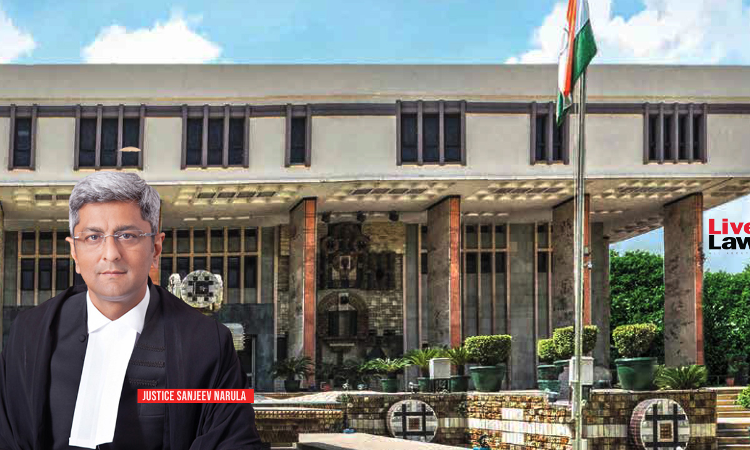- Home
- /
- High Courts
- /
- Delhi High Court
- /
- Guilty Plea Cannot Override Bar On...
Guilty Plea Cannot Override Bar On Double Jeopardy; Second Conviction For Same Offence Is Void: Delhi High Court
LIVELAW NEWS NETWORK
30 Oct 2025 11:15 AM IST
The Delhi High Court has held that a plea of guilt made by an accused does not efface the rule against double jeopardy and a Court cannot conduct second prosecution for the same offence, based on such a plea.Justice Sanjeev Narula observed,“A plea of guilt cannot confer jurisdiction. Once the bar under Section 300 CrPC or the rule against double jeopardy under Article 20(2) applies,...
The Delhi High Court has held that a plea of guilt made by an accused does not efface the rule against double jeopardy and a Court cannot conduct second prosecution for the same offence, based on such a plea.
Justice Sanjeev Narula observed,
“A plea of guilt cannot confer jurisdiction. Once the bar under Section 300 CrPC or the rule against double jeopardy under Article 20(2) applies, the conviction is a nullity, irrespective of the voluntariness of the plea or the sufficiency of evidence.”
The bench further held that where an accused raises an objection under Section 300 CrPC, the issue goes to the competence of the court and must be determined before recording any plea.
“A guilty plea cannot validate a proceeding that the law itself prohibits. Recording a plea of guilt without first determining a jurisdictional objection was a serious irregularity. More fundamentally, since the prosecution itself was barred by Section 300 CrPC and Article 20(2), the conviction was rendered void ab initio.”
The observations were made while granting relief to a man convicted in two FIRs arising out of the same offence of robbery.
The man had filed a writ petition seeking to quash the second conviction and to direct the Sentence Review Board not to consider the subsequent conviction as a disqualifying factor while assessing his case for premature release.
The Petitioner was convicted under Section 411 (dishonestly receiving or retaining stolen property)/34 IPC in FIR No. 23/2013.
He was also convicted in FIR No. 306/2012 for offences under Sections 411/ 482 (using a false property mark)/34 IPC.
Both FIRs arose from the same incident.
Before conviction in the second FIR, the Petitioner had moved an application under Section 300 CrPC seeking discharge on the ground that he had been previously convicted of the same offence.
The trial court however permitted him to plead guilty, without adjudicating the pending objection first.
In this context the High Court observed, “A valid conviction on plea requires the framing of charge, its explanation to the accused, an unequivocal admission, and the Magistrate's satisfaction of voluntariness. The absence of these materials, coupled with the jurisdictional bar, vitiates the conviction in its entirety.”
The High Court also observed that though its power to issue writs in criminal matters is circumscribed, however, interference is warranted where the proceedings were legally impermissible.
It noted Article 20(2) of the Constitution which declares that “no person shall be prosecuted and punished for the same offence more than once”.
Section 300(1) CrPC gives statutory expression to this principle, embodying the pleas of autrefois convict and autrefois acquit, and prohibiting a second trial for “the same offence” or on “the same facts” after a conviction or acquittal by a competent court.
Section 300(2) extends this protection to bar a subsequent trial for any “other offence” that could have been charged in the earlier proceedings under Section 221 CrPC on the same facts.
The High Court observed that where the offences are distinct in their essential ingredients, a second prosecution may lie even if narratives intersect. However, in the present case, it noted that he was convicted under Section 411, twice, for the same offence.
“The Petitioner's 2014 conviction under Section 411/34 IPC in FIR No. 23/2013 therefore exhausted the right of the State to prosecute him again for the same offence. The subsequent conviction in FIR No. 306/2012 under Section 411/34 IPC is thus barred by Section 300(1) CrPC and Article 20(2).”
In declaring so, the Court applied the test of 'sameness', articulated in Babubhai v. State of Gujarat (2010) and Anju Chaudhary v. State of U.P. (2013).
As per the “test of sameness”– if both FIRs concern the same incident or transaction, a second FIR cannot be sustained.
Next, the Court noted that conviction for offence under Section 482 IPC was equally based on the same offence, thus hit by the “consequence test”.
In C. Muniappan & Ors. v. State of Tamil Nadu (2010) and in Amitbhai Anilchandra Shah v. Central Bureau of Investigation and Anr. (2013), the Supreme Court had held that if the offence alleged in the second FIR arises as a consequence of, or is integrally connected with, the first, the latter FIR is subsumed in the former and cannot independently survive.
As such, the Court set aside Petitioner's subsequent conviction to the extent it records guilt under Sections 411/34 IPC and 482/34 IPC.
Appearance: Mr. Aman Gaur and Mr. Kumar Balram, Advocates for Petitioner; Mr. Sanjeev Bhandari, ASC for State with Mr. Arjit Sharma and Ms. Sakshi Jha, Advocates. Mr. Vinay Kumar, SI, PS-Vasant Kunj North.
Case title: Subhash Pahwa @ Subhash Chander v. State NCT of Delhi
Case no.: W.P.(CRL) 3143/2023



